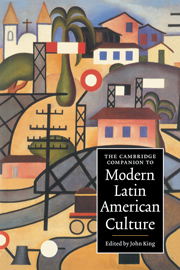Book contents
- Frontmatter
- Introduction
- 1 Pre-Columbian and colonial Latin America
- 2 Latin America since independence
- 3 Spanish American narrative, 1810-1920
- 4 Spanish American narrative, 1920-1970
- 5 Spanish American narrative since 1970
- 6 Brazilian narrative
- 7 Latin American poetry
- 8 Popular culture in Latin America
- 9 Art and architecture in Latin America
- 10 Tradition and transformation in Latin American music
- 11 The theatre space in Latin America
- 12 Cinema in Latin America
- 13 Hispanic USA
- Index
13 - Hispanic USA
literature, music and language
Published online by Cambridge University Press: 28 May 2006
- Frontmatter
- Introduction
- 1 Pre-Columbian and colonial Latin America
- 2 Latin America since independence
- 3 Spanish American narrative, 1810-1920
- 4 Spanish American narrative, 1920-1970
- 5 Spanish American narrative since 1970
- 6 Brazilian narrative
- 7 Latin American poetry
- 8 Popular culture in Latin America
- 9 Art and architecture in Latin America
- 10 Tradition and transformation in Latin American music
- 11 The theatre space in Latin America
- 12 Cinema in Latin America
- 13 Hispanic USA
- Index
Summary
Hispanic people in the United States are no longer on the fringes of society. According to the US Census Bureau, 38.8 million lived north of the Rio Grande in 2002. That is only a record of those who are legally present. Many more, perhaps millions, are also part of the United States, although they are not yet full-fledged citizens. Not even the words used to define them are unproblematic. Too many educators, administrators and general readers are unclear as to what exactly the term 'Latino' means. Does it encompass all people with a Hispanic background, regardless of where they are born or currently live? Is the category of race a defining factor? Or is it class, nationality and language? Is Latino literature written exclusively in Spanish and delivered in translation? These misunderstandings are a symptom of a collective need to delineate - to some, simplify - a community that is only recently being considered, in statistics, by politicians and the media, as a single, semi-homogenized group.to journalists like Roberto Suro and Juan González, the definition is becoming more concrete in the public sphere, but not rapidly enough to dispel the scores of questions that abound concerning the background and unity of the minority. The term Latino has come to be used to refer to people of Hispanic background born and/or living in the United States. In terms of their size and their history, they are a minority group made of various national subgroups. The three largest are Mexican-Americans, Cuban-Americans and Puerto Ricans on the mainland, followed by smaller groups such as Dominican-Americans and Colombian-Americans. In the general imagination, for decades this minority has been addressed in a myriad of ways, from the ‘Spanishspeaking people’ to hispanos to Latins.
- Type
- Chapter
- Information
- The Cambridge Companion to Modern Latin American Culture , pp. 314 - 343Publisher: Cambridge University PressPrint publication year: 2004



